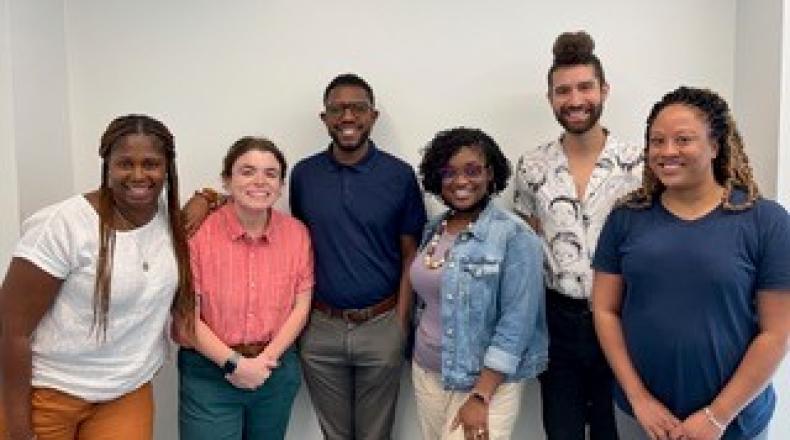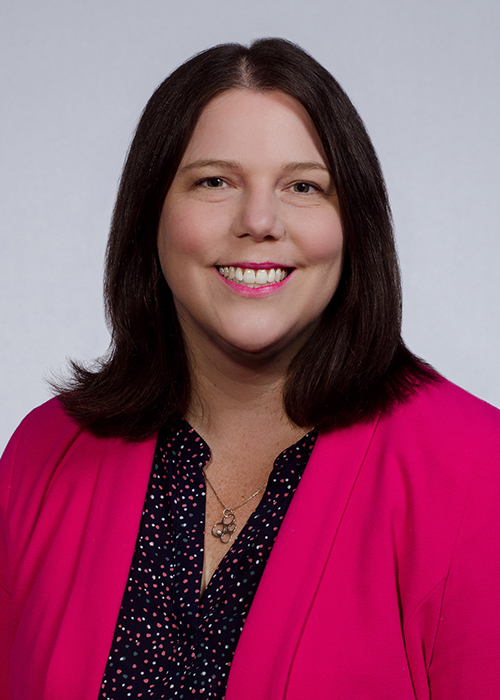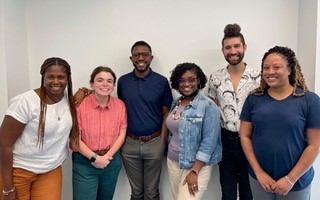AFP Chapter Spotlight: AFP Central Virginia

 Abbi Haggerty (right), president, AFP Central Virginia chapter, shares details about its Inclusive Fundraising Fellowship program, which aims to build a pipeline of fundraising leaders that reflect the diversity of our communities and develop practices that make a more just, equitable, and holistic Richmond fundraising community.
Abbi Haggerty (right), president, AFP Central Virginia chapter, shares details about its Inclusive Fundraising Fellowship program, which aims to build a pipeline of fundraising leaders that reflect the diversity of our communities and develop practices that make a more just, equitable, and holistic Richmond fundraising community.
The Central Virginia Chapter, based in Richmond, VA, was founded in 1996, They conduct monthly meetings in addition to a Spring Workshop and National Philanthropy Day®, annually.
Describe the Central Virginia Chapters Inclusive Fundraising Fellowship Program.

AFP Central Virginia Chapter’s Inclusive Fundraising Fellowship program offers inclusion-oriented education, training and networking activities, and one-on-one mentorship for Central Virginia-based mid-level and emerging nonprofit professionals representing a wide range of diverse backgrounds and interests. The goal of this program is to build a pipeline of fundraising leaders that reflect the diversity of our communities and develop practices that make a more just, equitable, and holistic Richmond fundraising community. A secondary goal is to share the learnings from this experience with the Richmond non-profit sector through the project component of the program
How did your chapter leadership collaborate to push this initiative forward?
In 2017, Jessica Cocciolone, a board member of the AFP Central Virginia Chapter, asked, “Why don’t the demographics of our fundraisers match the diversity of our communities?” She had not only noticed that lack of diversity in the fundraising profession, but also had also known people of color who had entered the profession and quickly left. So, she decided to do something about it.
In 2019, with support from The Monument Group, the Inclusive Fundraising Fellowship was born. Jessica continued to champion this effort, serving as a committee chair for the first two years. Board President-Elect Amanda Macdonald served as a co-chair last year and is the co-chair this year alongside a fellow from the second cohort.
What challenges did you encounter while working on the fellowship program?
Right now, our challenge is increasing participation. This is still a new program, and we hope that through vehicles such as this newsletter, we can increase awareness and involvement. The success of the program depends upon our ability to create a safe space where the fellows can share feelings and frustrations openly, which leads to productive discussions and innovative solutions. This environment is best achieved with a small group, and we aim to keep each cohort around seven to 10 people. Over the last three years, we have had about 10-15 people apply for the fellowship and most learn of it through word of mouth.
Can you talk about the history of the Emerging Leader and IDEA work in the Chapter?
Former board member Andrea Arthur started the IDEA Committee for our chapter, and we continue to link our IDEA work to all our committees. This year, we have changed the format and sponsorship levels for National Philanthropy Day to make the event more inclusive and more accessible, so smaller nonprofits can nominate their supporters and volunteers without having any sponsorship or ticket requirement if their applicant is selected as an honoree.
Through the fellowship, we are building future fundraising leaders both in our community and in our chapter. The program is designed to keep fellows involved, so they have leadership opportunities and can continue to improve the program.
At the end of each year, fellows are invited to join the planning committee for the next year. From there, we encourage committee members to apply for board membership, lead presentations for future fellowship sessions and/or chapter membership meetings, and to serve as mentors. Now in our third year, we have added paid facilitators to the fellowship. Nadia Gooray and Nicole Jones, both members of the first cohort, facilitate our program sessions each month under a contract with our chapter. In addition, two former fellows have joined the board of our chapter. Yasmin Gregg, a co-chair of this year’s program and a former fellow, plans to continue as both a leader on the chapter’s board and of this fellowship next year.
How has this fellowship program helped create an inclusive, diverse, equitable and accessible environment in your Chapter?
The fellowship is not only focused on learning. It is also about action and change. Throughout the year, the fellows work together to develop fundraising practices based on the principals of community-centric fundraising. The year ends with a public presentation of their learnings, which serves to educate those in the fundraising profession and inspire all of us to think about how we talk about the communities we serve and communicate with our donors.
In addition to the year-end presentation, we are finding opportunities to include these topics in our membership meetings. In October, the fellows from the second cohort will lead a panel discussion on equity in fundraising. At their urging, these presentations are all free of charge, making these events completely accessible. This year’s cohort will present at our December membership meeting, keeping equity in fundraising at the forefront of our conversations.
Did you hit any pitfalls as you were developing the program?
Covid was our biggest pitfall, as it cut our first year short and prevented that cohort from sharing their learnings at the end of the year. Some of those fellows did have the opportunity to present at our 2021 Virginia Fundraising Institute conference, which was held virtually.
What is your biggest success so far related to the Fellowship program?
Our biggest success is the community of diverse fundraisers that has developed from this program. Each cohort develops a special bond, and because most fellows stay on as members of the planning committee, they create a network of contacts for the incoming class. The fellows support each other, keep in touch, and are creating a more inclusive fundraising community.
What advice do you have for other chapters who are looking to start a similar program?
The biggest piece of advice is to start with humility, openness, and an eagerness to build empowering relationships that center on the fundraisers lived experiences. Lastly, what are you waiting for? Just do it!

